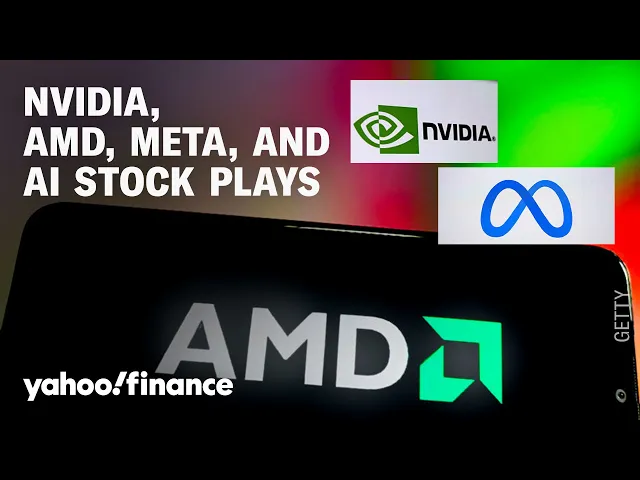Nvidia, AMD, Meta, and the AI trade: Analyst weighs in

Nvidia and the AI race: market trends ahead
In the rapidly evolving landscape of artificial intelligence, technology giants like Nvidia, AMD, and Meta are positioning themselves as key players in what might be the most significant technological transformation of our era. As investors and industry watchers scramble to understand the implications of this AI revolution, questions about valuation, market dominance, and long-term growth potential have become increasingly pressing. The recent discussion with a market analyst offers valuable insights into where these companies stand and what might lie ahead for the broader AI ecosystem.
Key insights from the analysis:
- Nvidia has established a dominant position in the AI infrastructure space with approximately 80% market share in AI chips, creating a formidable moat against competitors like AMD
- Despite high valuations, Nvidia's growth trajectory may still be in early stages as AI adoption continues to accelerate across industries
- Meta represents a different investment opportunity within the AI landscape, focusing on building AI capabilities to enhance its advertising business rather than selling infrastructure
The Nvidia phenomenon
Perhaps the most compelling observation from the analysis is the remarkable position Nvidia has carved out for itself. Unlike traditional tech monopolies that required decades to build their dominance, Nvidia has rapidly established itself as the backbone of AI infrastructure. Their CUDA software platform, which they've been developing for the past 17 years, provides them with a significant competitive advantage that competitors can't easily replicate.
This software-hardware integration creates what the analyst describes as a "flywheel effect." As developers build more applications on Nvidia's CUDA platform, it becomes increasingly valuable, making it harder for competitors to break in with merely comparable hardware solutions. This dynamic explains why AMD, despite offering cheaper alternatives, hasn't been able to significantly erode Nvidia's estimated 80% market share in AI chips.
What makes this particularly significant is the timing. We're witnessing what could be the early stages of an AI infrastructure build-out that may continue for years, if not decades. The comparison to cloud computing's evolution is apt—while cloud computing took years to reach mainstream adoption, AI seems to be accelerating at a faster pace, suggesting potentially greater returns for the companies positioned at the center of this revolution.
Beyond the chip wars: The Meta approach
While much attention focuses on the semiconductor battle between Nvidia and AMD, Meta represents an entirely different approach to capitalizing
Recent Videos
How To Earn MONEY With Images (No Bullsh*t)
Smart earnings from your image collection In today's digital economy, passive income streams have become increasingly accessible to creators with various skill sets. A recent YouTube video cuts through the hype to explore legitimate ways photographers, designers, and even casual smartphone users can monetize their image collections. The strategies outlined don't rely on unrealistic promises or complicated schemes—instead, they focus on established marketplaces with proven revenue potential for image creators. Key Points Stock photography platforms like Shutterstock, Adobe Stock, and Getty Images remain viable income sources when you understand their specific requirements and optimize your submissions accordingly. Specialized marketplaces focusing...
Oct 3, 2025New SHAPE SHIFTING AI Robot Is Freaking People Out
Liquid robots will change everything In the quiet labs of Carnegie Mellon University, scientists have created something that feels plucked from science fiction—a magnetic slime robot that can transform between liquid and solid states, slipping through tight spaces before reassembling on the other side. This technology, showcased in a recent YouTube video, represents a significant leap beyond traditional robotics into a realm where machines mimic not just animal movements, but their fundamental physical properties. While the internet might be buzzing with dystopian concerns about "shape-shifting terminators," the reality offers far more promising applications that could revolutionize medicine, rescue operations, and...
Oct 3, 2025How To Do Homeless AI Tiktok Trend (Tiktok Homeless AI Tutorial)
AI homeless trend raises ethical concerns In an era where social media trends evolve faster than we can comprehend them, TikTok's "homeless AI" trend has sparked both creative engagement and serious ethical questions. The trend, which involves using AI to transform ordinary photos into images depicting homelessness, has rapidly gained traction across the platform, with creators eagerly jumping on board to showcase their digital transformations. While the technical process is relatively straightforward, the implications of digitally "becoming homeless" for entertainment deserve careful consideration. The video tutorial provides a step-by-step guide on creating these AI-generated images, explaining how users can transform...
